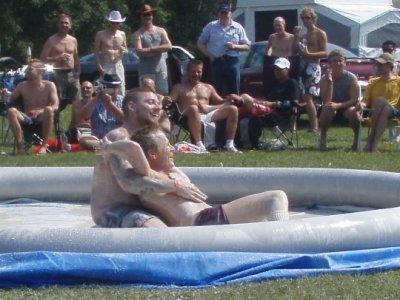There won’t be a parade, civic leaders won’t be in attendance or missed, and the festivities will likely be short of controversy and politics. In those regards, the Western Canadian Pride Festival — now in its seventh year — will be unlike any other Pride fest in Canada.
The four-day-long campout at the Watipi Lodge in Blackfalds, Alberta will be a chance to build a community of individuals that’s not defined only by sexual orientation, says festival organizer Leon Thompson.
“There’s a big shift with what’s happening with the liberal old guard,” Thompson says. “It had to be liberal because it had to be militant, but the community’s become more conservative because [the greater community] gets it. In the long run, we have to ask, What is the next step for the community?”
For Thompson, the shift means tailoring events to people’s individual needs and building up a community from that. According to its website, the camp battle cry is “We’re here! We’re queer! We’re over it! Now let’s play!”
The spirit of play is reflected in the festival theme, Fairy Tales Gone Wild, which emphasizes frivolity over politics.
“The camp is to help people get back to the basics of what they’re doing. Our one rule is if you have 361 bad days this year, leave it at the gate and love everyone for four days. What we’re kind of hoping for is that when people go back to their lives they realize they can put a bracket around their pain,” Thompson explains. “We’ve had people who were on the verge of suicide, and the camp changed their lives.
“When people arrive, we hug everybody at the gate and we get an emotional read on them. If our hugs go into them, they’re ready,” he says.
For campers that aren’t ready, volunteers called “social police” help break them out of their shells and make new friends.
“Whatever their big plight this year is, they write it on a paper and then we dispose of it in a ceremony so that they know they can release it,” Thompson says.
The camp is also about recognizing the achievements of the queer community in being accepted by the wider society.
“It’s really about being proud that there are a lot of changes that have happened in Western Canada,” Thompson says. “Alberta is actually becoming quite accepting of gay people. Saskatchewan is a little behind us. Interior BC is a little behind us.”
But Thompson hopes that the festival will also help push the queer presence into the mainstream in the more isolated, rural parts of the country.
“There’s a long term goal for advertising, too. I’m gonna be popping some signage on the Number 2 highway [connecting Calgary to Edmonton through Red Deer, extending north to Grand Prairie and south to the US border] too, saying ‘We’re here, we’re queer.’”
Thompson says he’s expecting more than 300 attendees at this year’s campout, including revellers from as far away as Yukon, BC and Saskatchewan.
“We’ve had people from Argentina, Brazil, Texas, Montana. Wherever they get wind of us — they might see it in a magazine — they come. Everyone’s welcome. The age group can be anywhere from 18 to 70,” he says.
At the festival, campers will be treated to sporting events, cookouts, dances, a theatrical performance and workshops on topics ranging from laughing yoga to dating success.
One of the most popular annual events is mud wrestling, Thompson says.
“It’s the fastest way for adults to become kids again,” he says. “But it’s not a cheap mud. It’s spa mud for your skin.”
“None of those things are mandatory,” Thompson is quick to add. “We’re trying to create a different atmosphere, almost like Burning Man. The key for us is community building.”


 Why you can trust Xtra
Why you can trust Xtra


